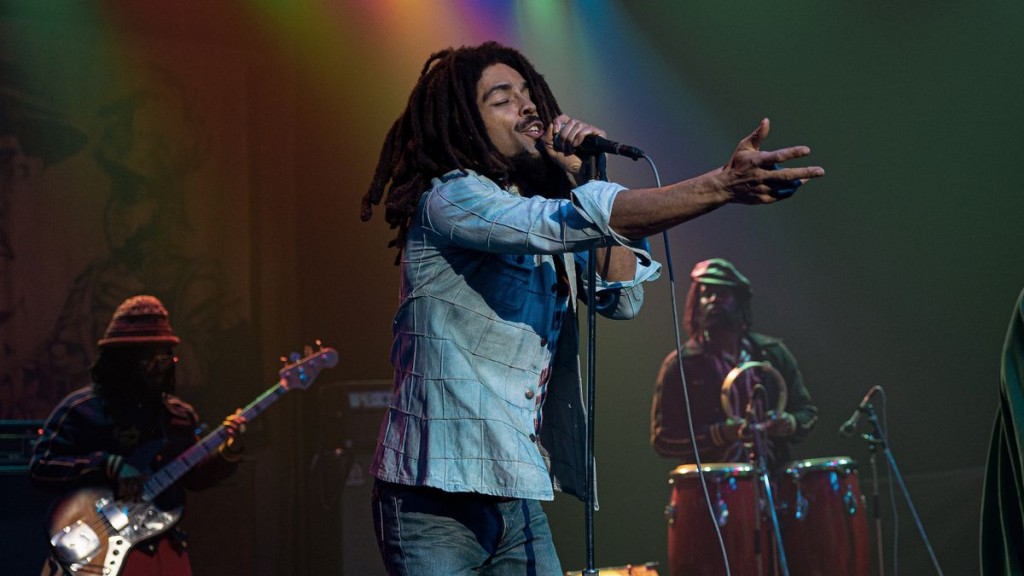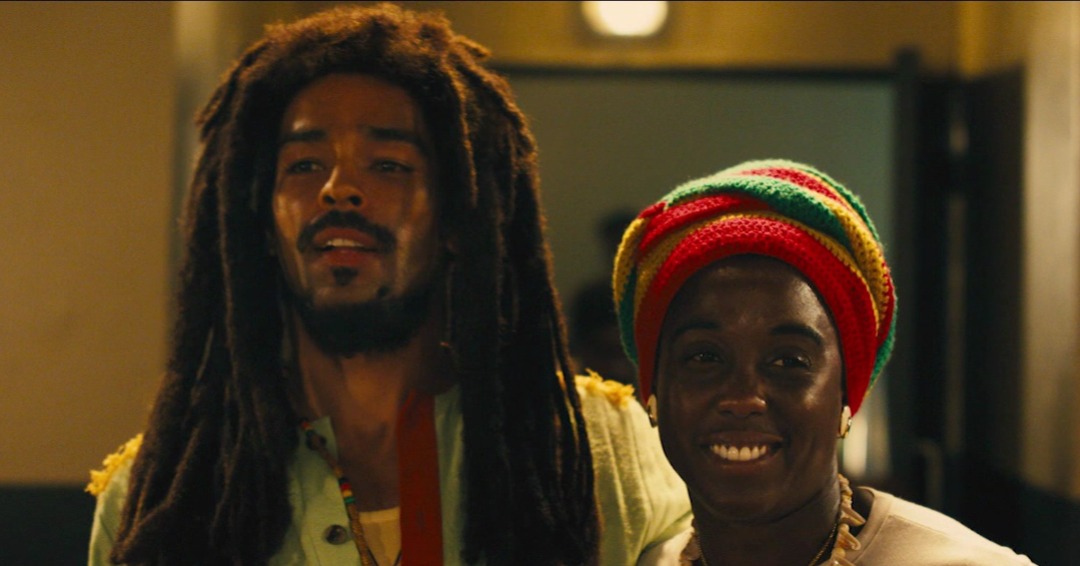FILM REVIEW
BOB MARLEY: ONE LOVE
Rated PG-13
107 Minutes
Released February 14th

I can remember hearing the warm, flowing sounds of Bob Marley’s music on the radio in the 1970s. At that time, before the internet, his bright, colorful concert posters were much sought after, the kind you hang prominently on your bedroom or dorm wall, both to seem cool and because of his music and his message – PEACE. Marley was one of those rarified beings who created a spirit that lives on long after he died tragically of cancer at age 36 in 1981.

Bob Marley was born in 1945 to a Black Jamaican teenager and a white plantation manager, who married when he was born but separated soon after. No stranger to struggle, Marley endured a lot of bullying in school for being biracial. Later, in the 1960s, he became a member of the Rastafari movement, whose followers believe that Ethiopian Emperor Haile Selassie, who had liberated his own people and culture, was God’s incarnation. Rastafarians believe that cannabis is the key to meditation.
As Marley put it, “When you smoke herb, herb reveals your Self to you.” Marley advocated for cannabis legalization and for the unification of African people worldwide. He also carried his Bible with him everywhere, along with his guitar. He started playing music as a child, partly influenced by music from American R&B radio stations whose powerful signals reached all the way to Jamaica. Many of his songs are about Africans rising up against imperialist rule. Rastafarianism was born in the intense suffering endured by Afro-Jamaican slaves, and out of that suffering rose Reggae music.
Marley wanted to bring reggae and his philosophy to the world and to bring together Jamaica’s disparate leaders in peace. At the time of his death, he was putting together a world tour. Another major force in his life was football (soccer). This history may help you comprehend the quick scenes, montages, and flashbacks that comprise this movie, an honest, though not at all in-depth recounting of Marley’s life from 1976-1978., which does not paint him as a saint, but with flaws as well as incredible magnetism and talent.
Many of his children became musicians. Bob helped Ziggy get into music. His son was just 12 when his father died. He says of his Dad, “Pieces of you are a part of me…everything we do is connected to you.”
The film, produced in part by Marley’s wife, Rita, his son Ziggy, and daughter Cedella. has been a huge success at the box office, and its audiences span all cultures, ages, and ethnicities. The extraordinary portrayal of Marley by Kingsley Ben-Adir and Paramount’s and director Reinaldo Marcus Green’s decision to use authentic Jamaican Patois without subtitles as the language are reasons for this success. I’ve noted that often, comprehension of words is not as important as the rhythm, inflections, and melody of a language.
You may find Patois hard to understand in the beginning, but you will quickly capture its meaning and flow. In Jamaica of the 1950’s, Patois was vilified as the language of the poor. Today, it’s taught in schools along with English. The vernacular mixes English with influences from African languages, Spanish, Hindi, and Chinese. Kingsley Ben-Adir, who plays Marley, said that doing the film in Patois was like doing it in French because it sounds like English, but there’s so much that’s not English. Green employed a linguistics expert, and they developed a phonetic writing system for Ben-Adir, who is Trinidadian and English, to assimilate the dialogue successfully. He masters the dialect so well that he seems to be really communicating in it rather than mastering an accent.
Ben-Adir’s musical performances as Marley are incredible. It took someone who has star quality in his own right to play this role. He portrays Marley’s calm, thoughtful presence and exuberance, seeming at once in the moment and rising above it. He seems so effortless in the role; it’s hard to remember how difficult it is to play a recent legend whose music and personality is so well known. Lashana Lynch is spectacular as the indomitable Rita Marley as well.
I hope that more films will be made about Marley – with Ben-Adir playing him. Marley’s eulogy stated that he left “an indelible imprint.” Ziggy says, “Like my father’s music, this movie is meant for the people, and his message of peace, love, and unity is clearly connecting with audiences around the world.” The movie had the biggest opening of all time in Jamaica. Marley’s message of peace in his own words: “Because my Father’s White, my Mother’s Black – you know what them call me, half-caste or wh’ever. Well, me don’t dip on the Black Man’s side nor the White Man’s side, me dip on God’s side, the Man who create me, who cause me to come from Black and White, Who give me this talent.”
Kathryn Whitney Boole has spent most of her life in the entertainment industry, which has been the backdrop for remarkable adventures with extraordinary people. She is a Talent Manager with Studio Talent Group in Santa Monica. kboole@gmail.com












